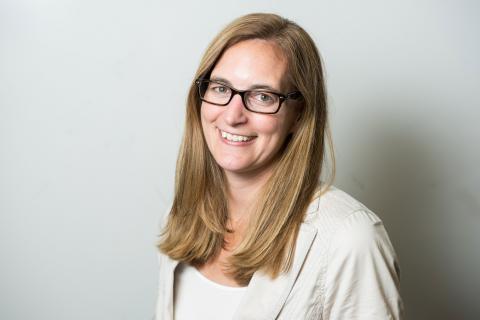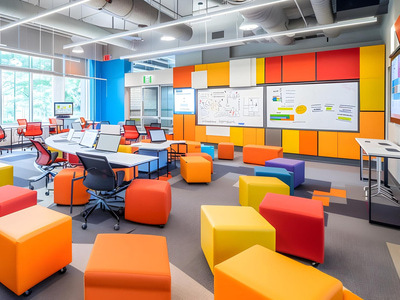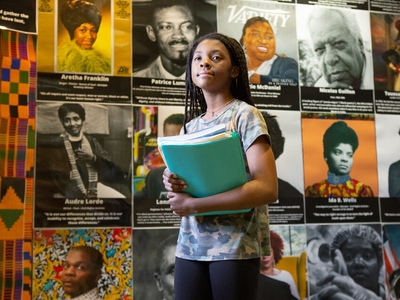New Designs for School
Choice, Trust, and Agency in Pinellas County Schools
Topics

We’ve all had the experience of truly purposeful, authentic learning and know how valuable it is. Educators are taking the best of what we know about learning, student support, effective instruction, and interpersonal skill-building to completely reimagine schools so that students experience that kind of purposeful learning all day, every day.
Practitioner's Guide to Next Gen Learning
In the district's transition to personalized learning, educators are focused on school culture with trust in students at the top of the list.
In today’s Friday Focus: Practitioner’s Guide to Next Gen Learning, you will:
- Discover the efforts to personalize learning in Pinellas County Schools, Florida
- Gain an appreciation for the strategies the district is using to build buy-in, capacity, and action
- Note the important role of establishing a school culture of choice, trust, and agency in the transition to personalized learning
“What do I like about personalized learning? You don’t have to sit at a desk all day listening to your teacher lecture and be bored to death. You do your own thing and get feedback. You get to explore new things.” —Meadowlawn Middle School student
Pinellas County Schools is a district on the Gulf Coast of Florida, just outside of Tampa. As a member of the Gates Foundation’s Next Gen Systems Initiative (NGSI), it is actively transforming its schools through personalized learning. The effort is known as Pinellas Innovates.
Pinellas hosted an NGLC learning excursion in March. We joined a two-day event that started with the district’s first-ever Innovation through Personalization Conference and ended with visits to four schools: Lealman Innovation Academy, Seminole Middle and High Schools, and Meadowlawn Middle School.
Transforming a District One Student, One Teacher, and One School at a Time
The district has taken a cohort approach to implement its long-term plan to personalize learning. One cohort of secondary schools is embracing personalization through project-based learning as part of the New Tech Network. A second cohort is shifting toward personalization through competency-based learning, with support from the Great Schools Partnership. A third cohort involves elementary schools that are working to adopt personalized learning practices. Schools in each cohort collaborate on design and planning.
The schools we visited demonstrated different strategies for rolling out their redesigned models. Lealman Innovation Academy has a pioneering “we’ll try anything if it means better outcomes for students” approach. In a very different strategy, the two middle schools invited teachers to opt into personalized learning, resulting in a first-year effort with a portion of the schools’ teachers and classrooms adopting the new model. The approach at Seminole High School combines school-wide changes in culture with project-based career academy selections.
The conference was an opportunity for teachers and school leaders throughout the district to learn about the innovations under way and for the educators involved in the work to share their successes and struggles. Choice, trust, and agency were common themes across sessions.
Personalized Learning Mindsets Inspired by High Tech High
“Personalization is taking education into your own hands and having people behind you supporting you the entire way.” —iHawk Academy student
When Pinellas Innovates first launched, the district sent a group of teachers, school leaders, and students to High Tech High (HTH) in California. The trip’s goal, according to Dennis Russo, NGSI project lead for the district, was to inspire, motivate, and alert them to the possibilities of personalized project-based learning. (NGLC also got to visit HTH this year—check out the Friday Focus edition on Learning Excursions for information and resources from our trip.)
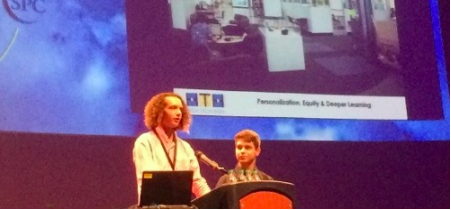
At the conference, two students who joined the trip shared their impression of HTH; in a nutshell it was “amazing!” Then they introduced the keynote speaker, HTH co-founder Rob Riordan.
About halfway through his captivating keynote, Riordan introduced us to the personalized learning mindsets that HTH encourages for students, teachers, and schools:

Riordan ended with a plea that we need to think less about controlling outcomes in education and think more about unleashing energy. This simple statement isn’t all that radical, but it is vastly different from the way K–12 education operates. And embracing this mentality creates all kinds of opportunities for redesigning school. When we think of students as creators, the job of schools becomes unleashing their energy to create the life they want to live and the world they want to live in. Watch the keynote speech (the student introduction starts at 12:30).
Unleashing Energy through Choice, Trust, and Agency
The four schools we visited are in their first or second year of transitioning to personalized learning. Choice, trust, and agency—the themes we discussed at the conference—were the hallmarks of personalized learning in practice. It was interesting to see that these were the aspects of personalized learning they started with as they shifted to project-based, competency-based, or blended learning. Here are examples of how choice, trust, and agency are practiced at Meadowlawn Middle School and Seminole High School.
Meadowlawn Middle School
The Meadowlawn teachers who elected to pilot personalized learning all use a roadmap for each unit to help students understand the pathway for learning. On the map, as shown in the example below, squares represent optional activities (students choose at least one), circles represent required tasks, stop signs represent skills checks to demonstrate mastery, stars are performance tasks, and arrows are “above-and-beyond” tasks.
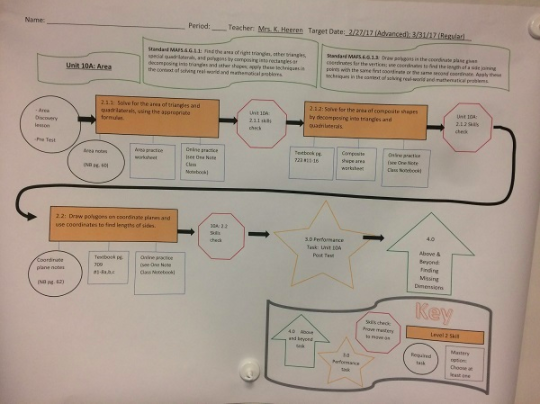
Agency is discussed regularly. We even heard students use the term! The school and students use a rubric to assess the degree students use their agency in class each day. They also use a weekly rubric to assess agency, task completion, and reflection.
The school is sharing their work on the Academy for Innovation at Meadowlawn website. “PL Year One Revisions” describes what teachers have tried and learned during their first year. The website includes a smart selection of resources, tools, and practical advice on the following topics:
- Learner Profiles—introduces the concept of the learner profile
- Culture of Success—explores growth mindset, agency, and student voice, among others
- Designing a Unit of Study—discusses aligning a competency-based learning approach with performance tasks to demonstrate mastery
- PL Management—addresses goal setting, time management, and progress monitoring
- PL Rubric—establishes what is expected in a personalized learning classroom
Seminole High School
“We believe learners are way more than a test score.” —Thomas Brittain, Seminole High School Principal
Personalized learning at Seminole High School is taking root in three ways: the iHawk Academy, Career Academies, and building a school culture of trust and agency.
- iHawk Academy—A cohort of students enrolls in the academy, which has fully adopted student-centered project-based learning.
- Career Academies—Students elect into an academy with a particular career focus, with the option to earn industry certification. The hands-on project-based curriculum engages students based on their interests.
- Culture of trust and agency—Little things add up, and the students and staff notice the differences made through culture shifts like these:
- Eliminating bells and “tardy tables”
- Creating a welcoming, engaging environment through Spirit Tunnels at freshmen orientation complete with the band, cheerleaders, and high fives from every upperclass student
- Incorporating more projects across the curriculum
As a result, attendance increased, discipline referrals decreased, and the graduation rate improved, all in one year.
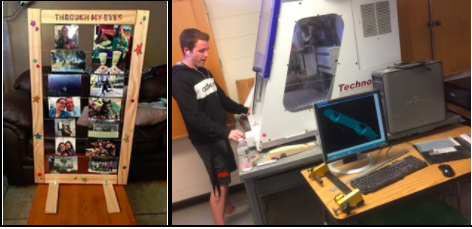
Additional Resources
- Student Panel—Morning, Innovation through Personalization Conference (video)
- Student Panel—Afternoon, Innovation through Personalization Conference (video)
- Lealman Innovation Academy Tour—Students planned, filmed, and edited this video tour of their school

